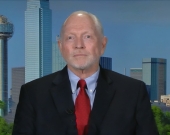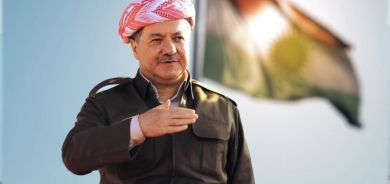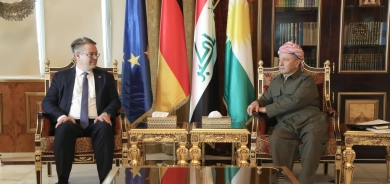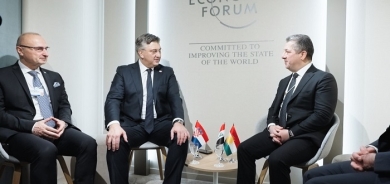Gulan Media Interview: Steven C. Roach on Alarming Russia-Iran Cooperation and China's Role in the Middle East

Steven C. Roach is a distinguished Professor of International Relations at the University of South Florida. He has extensive expertise in global ethics, human rights, global governance, critical international theory, and East African politics, with a particular focus on South Sudan. As a Fulbright Scholar and Honorary Professor, he has received prestigious awards and has published influential books on international affairs. Professor Roach's research contributions span various academic journals, and he serves on the editorial boards of several publications. He has also made significant contributions to the University of South Florida as the SIGS Director of Graduate Programs. Overall, Professor Roach is a highly respected scholar in the field of international relations.
Steven C. Roach, a renowned expert in international relations, has expressed deep concerns about the growing cooperation between Russia and Iran. In an interview with Gulan Media, he highlighted the alarming establishment of Iranian drone manufacturing facilities in Russian territory. Roach warned that this collaboration, fueled by the United States' withdrawal from the JCPOA, could lead to regional instability, human rights abuses, and even the transfer of nuclear technology to Iran.Roach acknowledges the positive step of Saudi Arabia and Iran reestablishing diplomatic ties but believes the United States' influence remains strong. He emphasizes the need for effective strategies to counter Putin's ambitions in Ukraine and highlights the fear driving countries to rebel against Russian sanctions. Roach cautions against neglecting challenges in the Middle East, noting China's limited capacity to replace US influence due to a lack of moral values.
Gulan Media: In your expert opinion, do you find the increasing cooperation between Russia and Iran alarming, particularly in light of the fact that Iran has now established drone manufacturing facilities within Russian territory?
Steven C. Roach: I do. But I am also not surprised, to be honest,, especially given that the United States withdrew from the JCPOA. There is little way of knowing where the growing ties between Iran and Russia will lead, but assuming that they do get stronger, their interventions in the Middle East and beyond will remain largely antagonistic and likely to lead to more regional instability, i.e., gross human rights abuses and, in the worst case scenario, transferring nuclear technology or even arming Iran with tactical nuclear warheads.
Gulan Media: What are your thoughts on the recent development of Saudi Arabia and Iran reestablishing diplomatic ties? Saudi Arabia has agreed to allow Iran to reopen its consulate in Saudi Arabia, and this agreement was brokered by China. Should the United States be concerned about the potential loss of its influence in the region?
Steven C. Roach: I think the renewed diplomatic ties are largely a positive development, since it underscores the emerging commitments to regional stability. The political stakes of course could not be higher in the region, With Iran on pace to make its own nuclear bomb(s) and to pose an even more menacing threat to its neighbors, there is the real possibility that we may see nuclear proliferation in the region. Whether or not this proves to be true, it makes China's initiative or mediation a welcome outcome, but one that is unlikely to eclipse the United States' long established and deep ties in the region any time soon. China, in my view, is still not a credible arbiter of peace or a third-party mediator like that of the United States, whose influence is rooted in widely appealing values such as democracy, human rights, and freedom. China, in fact, has long contested each one of these values, and yet, has offered no compelling values of its own to project and justify its intervention. For this reason, the United States has little to worry about. But that said, the greatest threat to the United States' global leadership lies from within or in its domestic politics, most notably, Christian nationalism and authoritarian populism (Trumpism anti-globalism), which are already eroding these very values.
Gulan Media: Why has the United States and NATO consistently provided financial support to Ukraine for weapons, ammunition, and air defense systems, but have not exerted substantial efforts in finding a comprehensive solution to end the ongoing war?
Steven C. Roach: I believe the US and Nato have been wary to intervene beyond this established threshold of financial and military support. The main reason is Putin himself, whose imperialist ambitions, brutal disregard for human life, and threats to use nuclear tactical weapons render any negotiations for comprehensive agreement difficult, if not unfeasible. Keep in mind that Russia forcibly annexed Crimea and eastern parts of the Ukraine, annexations that form the cornerstone of Putin's unfettered ambition to occupy all of the Ukraine. So, the most reasonable strategy (for the United States and Nato), it seems, is to wear down or demoralize the enemy, such that internal tensions or party infighting can begin to weaken Putin and his imperialist ambitions.
Gulan Media: What are your thoughts on certain countries rebelling against and disregarding sanctions imposed on Russia? Do you believe their actions stem from a fear of being targeted next or are they expressing their discontent with Western dominance and influence over global affairs?
Steven C. Roach: There is certainly fear, but this is due largely to Russia's growing influence in the region, that is, its stronger ties with countries such as Syria. The United States is still suffering the economic and political consequence of having started wars in Afghanistan and Iraq, only to leave these countries more unstable and the people betrayed. This can only suggest that more Midde Eastern countries will learn the lesson of relying on the United States for support, by turning to other Major Powers. In my view, then, it is not so much discontent with Western dominance but rather the failure to effectively assert this dominance vis-a vis the rising influence of Russia.
Gulan Media: We are witnessing Ukraine's counteroffensive strategy, and it appears that Russian soldiers are managing to withstand it. If Ukraine's counteroffensive proves unsuccessful, could this potentially have catastrophic consequences for them? Specifically, would it allow the Russian military to regroup and launch their own counteroffensive with significant advantages?
Steven C. Roach: Even if the counteroffensive proves unsuccessful, there will still be enough arms supplies and Western assistance flowing into Ukraine to buoy the Ukraine's efforts against Russia. Right now, it appears that the Russian military is too divided militarily or lacking the necessary morale to mount its own counteroffensive. And it remains unclear if the recent short-lived insurrection weakened Putin and whether this will alter Russia's strategy in the short or even long term.
Gulan Media: What is your perspective on the United States potentially neglecting to address its challenges in the Middle East, and do you believe this creates an opportunity for China to assume a greater role and fill the void, as evidenced by its involvement in brokering peace deals in the region?
Steven C. Roach: I certainly do think it does. At the very least it allows China to make some diplomatic inroads. What we have been seeing with China in the Middle East is a curious break from its largely economic, supportive role in Latin America. and Africa. But the break almost seems superficial or an isolated event, which returns us to my earlier point, namely, that the reason why China will necessarily struggle to fill the void left by the United States is that it lacks a moral vision or attendant values to build the ties (and positively shared sentiment) with not just the government but also the people of that country. What I have found in all my travels and research assignments in Africa and in parts of Latin America, is that China's appeal as Major Power has always paled in comparison to that of the United States. It still lacks, for instance, the social capital or trust to replace the United States' brokering or bargaining power in the Middle East.















